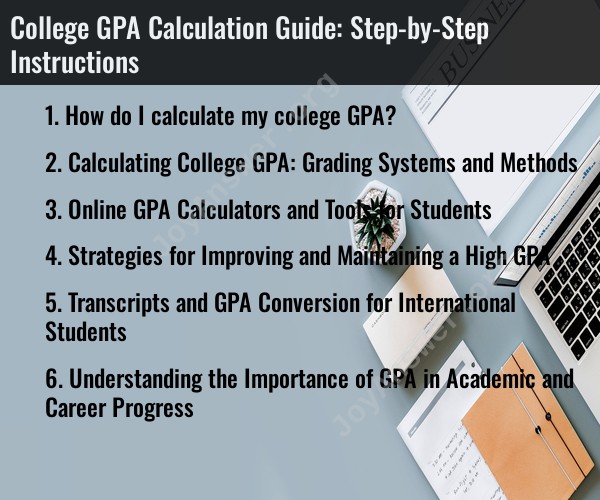How do I calculate my college GPA?
Calculating your college GPA (Grade Point Average) is a straightforward process that involves some basic math. Here's a step-by-step guide to help you calculate your college GPA:
Step 1: Gather your course information.
Before you start, you'll need to have the following information for each of your courses:
- Course name
- Number of credit hours (also known as credit units or credits)
- The letter grade you received in the course (e.g., A, B, C, D, F)
- The grade scale used by your college (usually on a 4.0 scale, but it can vary)
Step 2: Assign grade points to each letter grade.
Most colleges use a 4.0 scale to calculate GPA. The grade points are typically assigned as follows:
- A: 4.0
- A-: 3.7
- B+: 3.3
- B: 3.0
- B-: 2.7
- C+: 2.3
- C: 2.0
- C-: 1.7
- D+: 1.3
- D: 1.0
- D-: 0.7
- F: 0.0
If your college uses a different scale, make sure to use the corresponding grade points.
Step 3: Calculate grade points earned for each course.
For each course, multiply the grade points (from Step 2) by the number of credit hours for that course. This will give you the grade points earned for that specific course.
Grade Points Earned = Grade Points (from Step 2) × Credit Hours
For example, if you received a B (3.0 grade points) in a 3-credit course, you earned 3.0 × 3 = 9.0 grade points for that course.
Step 4: Calculate the total grade points.
To find your total grade points, add up the grade points earned for all your courses. This will give you the sum of all the grade points you've earned throughout your college career.
Total Grade Points = Sum of Grade Points Earned for All Courses
Step 5: Calculate your GPA.
To calculate your GPA, divide the total grade points (from Step 4) by the total number of credit hours for all your courses.
GPA = Total Grade Points / Total Credit Hours
For example, if you have earned 75 grade points and have completed 30 credit hours, your GPA would be 75 / 30 = 2.5.
That's it! You've now calculated your college GPA. You can follow these steps for each semester or term, and then calculate your cumulative GPA by considering all the courses you've taken so far.
Calculating College GPA: Grading Systems and Methods
Grading systems vary from college to college, but they typically use a four-point scale, with A being the highest grade and F being the lowest. Some colleges also use a plus/minus system, which allows for more nuanced grading.
To calculate your GPA, you first need to convert your letter grades to numerical values. Here is a common conversion scale:
| Letter grade | Numerical value ||---|---|---|| A | 4.0 || A- | 3.7 || B+ | 3.3 || B | 3.0 || B- | 2.7 || C+ | 2.3 || C | 2.0 || C- | 1.7 || D+ | 1.3 || D | 1.0 || F | 0.0 |
Once you have converted your letter grades to numerical values, you can calculate your GPA by taking the average of your grades. For example, if you received an A in one class and a B in another class, your GPA would be 3.5.
Online GPA Calculators and Tools for Students
There are many online GPA calculators and tools available to help students calculate their GPA. These calculators can be helpful for estimating your GPA, but it is important to verify your GPA with your school's registrar's office.
Strategies for Improving and Maintaining a High GPA
Here are some strategies for improving and maintaining a high GPA:
- Attend all classes and participate actively. This will help you to learn and understand the material, and it will also show your professors that you are engaged in your studies.
- Complete all assignments on time and to the best of your ability. This means taking the time to proofread your work and to make sure that it is well-organized and well-written.
- Study effectively and efficiently. This means finding study methods that work for you and sticking to them. It also means taking breaks and managing your time wisely.
- Seek help when you need it. Don't be afraid to ask your professors, classmates, or TAs for help if you are struggling with a particular concept or assignment.
Transcripts and GPA Conversion for International Students
If you are an international student applying to a US college, you will need to submit your transcripts and have your GPA converted. There are a few different ways to do this.
One way is to use a service such as WES (World Education Services). WES will evaluate your transcripts and provide you with a US GPA equivalent.
Another option is to have your transcripts translated by a certified translator and then have them evaluated by a US college or university.
Finally, some US colleges and universities have their own GPA conversion scales. You can check with the colleges and universities that you are interested in to see if they have a specific GPA conversion scale that they use.
Understanding the Importance of GPA in Academic and Career Progress
GPA is an important factor in academic and career progress. A high GPA can help you to get into a good graduate school or to get a good job. However, it is important to remember that GPA is just one factor that colleges and employers consider. Other factors, such as your extracurricular activities, letters of recommendation, and personal statement, are also important.
Here are some of the ways that GPA can impact your academic and career progress:
- College admissions: Colleges and universities use GPA to help them make admissions decisions. A high GPA can make you more competitive in the admissions process.
- Scholarships and financial aid: Many scholarships and financial aid programs have GPA requirements. A high GPA can help you to qualify for more scholarships and financial aid.
- Graduate school admissions: Graduate schools use GPA to help them make admissions decisions. A high GPA can make you more competitive in the graduate school admissions process.
- Job applications: Many employers consider GPA when hiring new employees. A high GPA can make you more competitive in the job market.
Overall, GPA is an important factor in academic and career progress. However, it is important to remember that GPA is just one factor that colleges and employers consider. Other factors, such as your extracurricular activities, letters of recommendation, and personal statement, are also important.











